|
Campus joins the top 10 for the first time since 2014 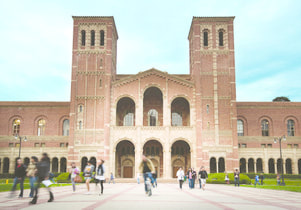 UCLA UCLA CLA is one of the world’s leading universities, according to leading academics from around the world. In the newest Times Higher Education World Reputation Rankings, published today, UCLA placed No. 2 among U.S. public universities and No. 9 among all universities worldwide, public or private. UCLA joins the top 10 for the first time since 2014. The reputation survey, completed by more than 10,000 senior academics from 138 countries, was established in 2011 as a spinoff of the annual Times Higher Education World University Rankings. The questionnaire targets published scholars for their views on excellence in research and teaching within their disciplines and at institutions with which they are familiar. The survey data will be used alongside 11 objective indicators to determine this year’s THE World University Rankings, which will be published in September. Among U.S. public universities, UCLA was behind only UC Berkeley, which was No. 6 overall. UCLA consistently performs well in multiple rankings. In January, UCLA topped Forbes’ Best Value Colleges ranking. In addition, UCLA was named the No. 1 public institution in the nation in three separate assessments last fall: U.S News and World Report Best Colleges rankings, the Times Higher Education World University Rankings and the Wall Street Journal/Times Higher Education Top Colleges rankings. Source: www.newsroom.ucla.edu
0 Comments
By Julia Ann Easley on June 13, 2018 in Student Life "Do not be ashamed to take care of yourself first. I feel like a lot of us come to university wanting to change the world and make a difference. We put immense pressure on ourselves. However, whether it be something material like food or something immaterial like love and support, you can only give to others what you have yourself. Reach out for support from others who care and seek out the resources available on campus. We can all do our part to combat the stigma on mental health issues by encouraging open and honest conversations about our own mental health." — Emily Eijansantos, 2018 University Medalist A kick. A jab. The flash of a sword. Emily Eijansantos of Livermore, California, executes the movements of wushu martial arts with strength of spirit and showmanship — in such contrast to the anxiety and self-doubt she experienced during her early studies at the University of California, Davis. Helped by the sport to recover her own emotional well-being and raise funds in support of mental health, she will be honored as the campus’s top graduating senior on Sunday, June 17. Eijansantos, who has earned a Bachelor of Science in neurobiology, physiology and behavior, will be presented with the University Medal at the College of Biological Sciences commencement. The award, which includes a $2,000 honorarium, is for excellence in undergraduate studies, outstanding community service and the promise of future scholarship and contributions to society. “I was really moved,” Eijansantos said of her feelings when she learned she had won the prestigious award. A stellar student in high school and at UC Davis, as a freshman she found herself struggling to present herself in interviews for internships. It started a downward spiral that crushed her self-esteem, kept her from making new friends, and almost robbed her of her dream of becoming a doctor. When she did finally get a position in a campus lab, she said, “every mistake felt like an earthquake.” A lab partner’s kind words encouraged her to take the perspective that failure is a part of the scientific process and to persevere. Finding familyEijansantos was motivated to return to the martial arts she had enjoyed as a youth. “I needed to do something that was not academic, something just for me,” she said. Through the Davis Wushu student group, she found a family away from home. “That’s when I started to bounce back,” she said. Eijansantos distinguished herself in the lab, where she researched ibuprofen’s effects on heart cells. She won two awards to support her research and already has had research papers published in academic journals. (Read more about her research experience.)
In the winter of her junior year, she started volunteering at UC Davis Hospice. “Listening to these patients and their wisdom has really put a lot of my own life into perspective and encouraged me to pursue my ambitions wholeheartedly,” Eijansantos said. Later as a volunteer with the Connected Clinic at UC Davis for women with postpartum depression, she called mothers to encourage them to come to the clinic, observed support groups and transcribed a researcher’s notes. ‘It was for the patients’When she learned Connected lacked a regular budget, she was inspired to organize a fundraising event through Davis Wushu, an undertaking that later threatened to overwhelm her. “I got really scared,” Eijansantos said. “But, unlike those interviews, it wasn’t about me anymore. It was for the patients, so I pushed myself really hard.” “Fight the Stigma!: A Charity Showcase” was a success. More than 200 people attended the event, and it raised about $1,000, most for Connected and some to help establish a new student group to provide ongoing support to the clinic and related causes. Shannon Clark, the UC Davis Health doctor who runs Connected, was thrilled by what Eijansantos did and to know she plans to go to medical school. “She will be carried far by her strong drive and personal quest for a meaningful life and serving others — especially the underserved and most vulnerable members of society,” she said. Source: www.ucdavis.edu Civil rights advocate and scholar Michelle Deutchman to oversee advancement of innovative center 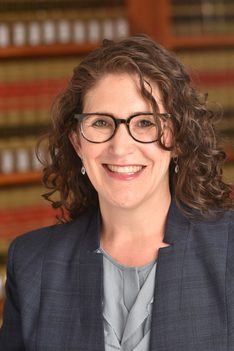 “I am excited by the prospect of leveraging my energy and expertise to advance the dialogue around free speech and civic engagement,” says Michelle Deutchman, who will be the first executive director of the UC’s National Center for Free Speech and Civic Engagement. UCLA School of Law “I am excited by the prospect of leveraging my energy and expertise to advance the dialogue around free speech and civic engagement,” says Michelle Deutchman, who will be the first executive director of the UC’s National Center for Free Speech and Civic Engagement. UCLA School of Law Irvine, Calif., April 23, 2018 — A civil rights advocate and scholar with more than a decade of experience advancing free speech as an attorney and instructor has been named the first executive director of the University of California’s National Center for Free Speech and Civic Engagement. Michelle Deutchman will join the center from the Anti-Defamation League, where she serves as national campus counsel. In this role, she provides guidance to ADL’s 24 regional offices on matters related to speech on college campuses. She assumes her new role on May 29 and will report to University of California, Irvine Chancellor Howard Gillman, who – as co-chair of the center’s advisory board – provides administrative oversight of the center. “Michelle has extraordinary experience addressing issues of free expression and campus climate and has worked extensively with campus constituencies to improve the national debate,” said Gillman, a nationally recognized constitutional and free speech scholar. “Her passion and expertise make her a perfect fit for this important role.” The selection of an executive director marks a critical next step in the development of the center, which was launched by UC President Janet Napolitano last October, with Gillman and Erwin Chemerinsky, dean of the UC Berkeley School of Law, as co-chairs of an advisory board of noted elected officials, journalists, academics and corporate leaders. As executive director, Deutchman will be responsible for planning and executing center activities, including advancing its fellows program, establishing national conferences, and serving as a liaison to UCI, the UC Office of the President and sister UC campuses, as well as other universities and organizations engaged in shaping national discourse about free speech. She will be based in the UCDC Center in Washington, D.C., and at UCI. “The National Center for Free Speech and Civic Engagement is developing into a vital resource advancing research, education and advocacy in these areas so key to American democracy, and Michelle will provide the leadership essential to its future success,” said Napolitano. A free speech scholar and advocate Since joining ADL in 2003, Deutchman has honed her focus on campus free speech subjects, providing guidance on issues related to free expression, which include policies and best practices for responding to all forms of protected speech. She has collaborated with state and national colleagues to educate and assist campus leaders in addressing the challenges of increased polarization among incoming freshman classes and of a political climate in which hateful rhetoric and incivility have become normalized. Deutchman also takes her expertise into the classroom, where she teaches about on-campus free speech, cyberbulling and the law, religion in schools, and responding to hate crimes. She’s led courses at state universities, school districts, county and state agencies, and numerous police and sheriff’s offices. Since 2014, Deutchman has served as a lecturer at the UCLA School of Law. “I am excited by the prospect of leveraging my energy and expertise to advance the dialogue around free speech and civic engagement,” she said. “It will be a privilege to help further establish the center and to grow its influence as a vital resource on the national stage.” A Los Angeles native, Deutchman earned a bachelor’s degree in political science at UC Berkeley and a law degree at the University of Southern California. She was in private practice before being hired at ADL. “I have known Michelle since she was my student at the USC law school, and we have often worked together on free speech issues over the years,” said Chemerinsky, who with Gillman is the author of Free Speech on Campus. “We could not have a better executive director to help create a preeminent center on free speech and civic engagement on campuses.” Advancing research, education and advocacy The University of California – birthplace of the Free Speech Movement – launched the National Center for Free Speech and Civic Engagement to support and advance research, education and advocacy on these challenging issues. In February, the center announced its first 10 fellows. These scholars, students and analysts from across the country are spending a year researching timely, vital First Amendment topics. Their work will include developing tools, analyzing data and deriving lessons from history. Each will reside for a week at one of the 10 UC campuses to engage with students, faculty, administrators and community members. In addition, the center named three new board members – National Public Radio White House correspondent Tamara Keith, Twitter general counsel Vijaya Gadde and UC Regent Emeritus Harvey Brody – joining former U.S. Sen. Barbara Boxer, former U.S. Secretary of Education and CEO of The Education Trust John King, Facebook strategic communications director Anne Kornblut, UCLA law student Avi Oved, New York Times columnist Bret Stephens, University of Chicago Law School professor Geoffrey R. Stone and Washington Post columnist George Will. A national conference will be held later this year to allow the fellows to share their research and create an opportunity for elected officials, university leaders and others to come together to explore new approaches to engaging and educating students about the critical role of the First Amendment in American democracy. About the University of California, Irvine: Founded in 1965, UCI is the youngest member of the prestigious Association of American Universities. The campus has produced three Nobel laureates and is known for its academic achievement, premier research, innovation and anteater mascot. Led by Chancellor Howard Gillman, UCI has more than 30,000 students and offers 192 degree programs. It’s located in one of the world’s safest and most economically vibrant communities and is Orange County’s second-largest employer, contributing $5 billion annually to the local economy. For more on UCI, visit www.uci.edu. Media access: Radio programs/stations may, for a fee, use an on-campus ISDN line to interview UCI faculty and experts, subject to availability and university approval. For more UCI news, visit news.uci.edu. Additional resources for journalists may be found at communications.uci.edu/for-journalists. Source: www.news.uci.edu 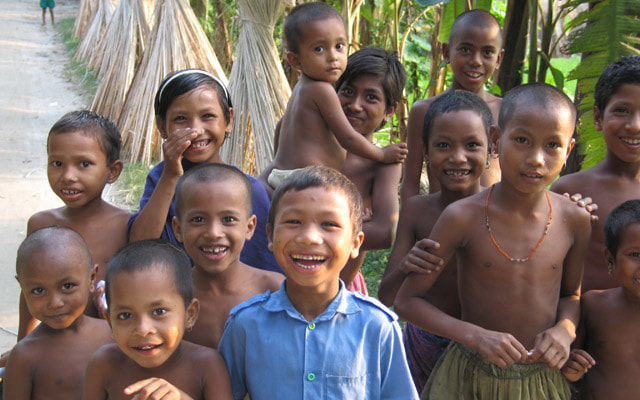 These children live in Bangladesh, where UC San Diego researchers are leading a clinical trial to determine if a repurposed rheumatoid arthritis drug can be used treat amebiasis and giardiasis. Image source: Flickr/IRRI Neglected tropical diseases are a group of chronic and disabling parasitic infections that primarily affect poor and underserved communities. These diseases affect more than 1 billion people globally, yet are rarely the target of new drug discovery efforts. According to the World Health Organization (WHO), global climate change will most likely alter the communities at greatest risk for these diseases, as changes in temperature and rainfall influence the distribution and life cycles of the insects that transmit these parasites. In some cases, insects and the parasites they carry have already begun emerging in regions where they were previously unheard of, including the United States. Leveraging its strengths in molecular biology, clinical research and pharmaceutical sciences, the University of California San Diego has now launched a new Center for Anti-Parasitic Drug Discovery and Development to address this unmet need in global health. “These diseases are called ‘neglected’ because there is little economic incentive for the pharmaceutical industry to intervene,” said James McKerrow, MD, PhD, Distinguished Professor, dean of Skaggs School of Pharmacy and Pharmaceutical Sciences at UC San Diego and head of the new center. “Since we are a public university, we have a duty to meet that challenge.” The center will involve 15 research and clinical faculty at UC San Diego, representing three schools and five departments — an unprecedented, interdisciplinary cadre of scientists dedicated to helping alleviate diseases of the poor worldwide, McKerrow said. UC San Diego researchers use robotic technology to screen hundreds of thousands of chemical compounds from a variety of sources — including drugs abandoned by pharmaceutical companies and marine natural products — for their ability to kill parasites while leaving human cells unharmed. More than 10 disease-causing parasites are maintained and used for drug screening at UC San Diego. When promising drug precursors are identified, in-house experts can computationally and chemically optimize them, and further test the compounds in laboratory experiments and animal models of disease. This drug development pipeline is supported by UC San Diego Altman Clinical and Translational Research Institute, where researchers are able to carry out the entire process of drug discovery and development, including human clinical trials. With modest support to date, the center’s researchers are already leading advances in drug discovery and development for neglected parasitic diseases. For example, team members are developing a chemical compound for the treatment of malaria; working with pharmaceutical companies to develop potential drugs for Chagas Disease and schistosomiasis; and leading a clinical trial in Bangladesh to determine if a repurposed rheumatoid arthritis drug can be used treat amebiasis and giardiasis. The robotic drug screening facility in Skaggs School of Pharmacy and Pharmaceutical Sciences at UC San Diego allows researchers to rapidly and reproducibly test hundreds of thousands of chemical compounds (potential drug precursors) for their abilities to kill the parasites that cause neglected tropical diseases. In addition, UC San Diego is the only place outside the Centers for Disease Control and Prevention (CDC) working with the animal model for Naegleria fowleri, a universally fatal brain-eating amoeba that can infect people swimming in warm freshwater worldwide, including the United States. Now, thanks to seed funding from the UC San Diego Chancellor’s office, McKerrow and the center team can take the first steps to streamline these efforts and more rapidly move their initial findings along the drug pipeline. “No other center is equipped to study these many organisms and target the diseases they cause,” McKerrow said. “No other entity — academic, government or industrial — covers the spectrum of parasite research and drug discovery from basic science to clinical trials at one site.” The UC San Diego Center for Anti-Parasitic Drug Discovery and Development includes: Skaggs School of Pharmacy and Pharmaceutical Sciences
UCSF's medical and nursing schools, as well as PhD programs, ranked highly in this year's U.S. News Best Graduate Schools survey. Photo by Elisabeth Fall 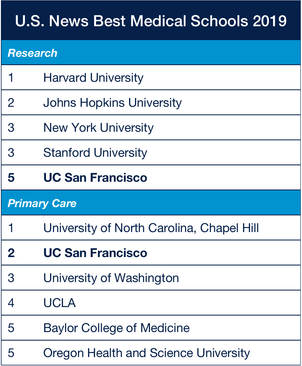 Lewis Lanier, PhD, chair of the Department of Microbiology and Immunology, speaks with graduate student Viola Lam in his Parnassus Heights campus labratory. UCSF ranked No. 1 among immunology/infectious disease programs in the 2019 Best Graduate Schools survey. Photo by Noah Berger UC San Francisco’s School of Medicine placed in the top five nationally in this year’s U.S. News & World Report survey of best graduate and professional schools. UCSF’s biomedical science PhD programs were among the top 10, and the School of Nursing was also highly ranked. UCSF was the only medical school to be ranked in the top five in both of the broad categories – biomedical research and primary care – the magazine uses to assess medical education; the school was fifth in biomedical research and second in primary care education. The School of Medicine was in the top five in all seven of the specialty areas covered by the survey this year: second in anesthesiology, obstetrics & gynecology, and radiology; third in internal medicine; fourth in surgery; and fifth in pediatrics and psychiatry. “By excelling equally in research and primary care, we serve as a model for 21st Century medicine,” said Talmadge E. King Jr., MD, dean of the School of Medicine. “We attract some of the brightest, most dedicated students because our training is both rooted in science and committed to fulfill the promise of a better future for our patients, our communities, and the world.” The UCSF Graduate Division’s doctoral training programs in biology placed sixth overall, with five specialty programs placing in the top five. UCSF was first in immunology/infectious disease and in molecular biology; third in neuroscience/neurobiology; fourth in cell biology; and fifth in biochemistry/biophysics/structural biology. "As the Graduate Division dean, it's heartening for me to see this testimony to the high caliber of our PhD programs, although these annual rankings can only tell part of the story,” said Elizabeth Watkins, PhD, dean of the Graduate Division and vice chancellor of Student Academic Affairs. “All of our graduate students, even those in the programs that are not ranked, benefit from the outstanding faculty – graduate and professional – at UCSF, and from the collaborative nature of research on our campus. Moreover, every student at UCSF has access to innovative career and professional development resources that will ensure they succeed in their eventual careers." Lewis Lanier, PhD, chair of the Department of Microbiology and Immunology, speaks with graduate student Viola Lam in his Parnassus Heights campus labratory. UCSF ranked No. 1 among immunology/infectious disease programs in the 2019 Best Graduate Schools survey. Photo by Noah Berger The majority of researchers at the University’s four schools of Dentistry, Medicine, Nursing, and Pharmacy are affiliated with the Graduate Division’s doctoral training programs. The schools are also part of an integrated hospital and biomedical research enterprise that includes a Top 5 hospital and world-class biomedical research laboratories. The UCSF School of Nursing was 11th overall among nursing master’s degree programs, and its specialty programs were highly ranked. UCSF was in the top 10 in three of the five ranked nursing programs that it offers: family; pediatric primary care; and psychiatric/mental health across the lifespan. Adult gerontology primary care was ranked eleventh. The survey did not rank nurse midwifery programs this year, but UCSF was first in the last ranking, which came in 2016. “The School of Nursing has long been recognized for its excellence in the preparation of leaders in nursing and remains a top recipient of research dollars from the National Institutes of Health,” said Dean Catherine Gilliss, PhD, RN, FAAN. “Our masters curriculum is undergoing a revision that we believe will bring us even better results in the next survey.” UCSF Biological Sciences Programs: #6 Overall #1 Immunology / Infectious Disease #1 Molecular Biology #3 Neuroscience / Neurobiology #4 Cell Biology #5 Biochemistry / Biophysics / Structural Biology UCSF Nursing Master's Program #11 Overall #6 Psychiatric / Mental Health, Across the Lifespan #9 Pediatric, Primary Care #10 Family #11 Adult / Gerontology, Primary Care Although UCSF also has top schools of Dentistry and Pharmacy, U.S. News does not rank dental schools, and the magazine did not rank pharmacy schools this year. “Among the many things that UCSF does, education is at its core,” said UCSF Chancellor Sam Hawgood, MBBS. “California and the nation look to us to train the next generation of doctors, nurses, dentists and pharmacists, as well as the researchers who will advance each of these fields, and our faculty rise to the challenge every year.” Results are published in the magazine’s 2019 issue of “Best Graduate Schools." UC San Francisco (UCSF) is a leading university dedicated to promoting health worldwide through advanced biomedical research, graduate-level education in the life sciences and health professions, and excellence in patient care. It includes top-ranked graduate schools of dentistry, medicine, nursing and pharmacy; a graduate division with nationally renowned programs in basic, biomedical, translational and population sciences; and a preeminent biomedical research enterprise. It also includes UCSF Health, which comprises top-ranked hospitals, UCSF Medical Center and UCSF Benioff Children’s Hospitals in San Francisco and Oakland – and other partner and affiliated hospitals and healthcare providers throughout the Bay Area. Source: www.ucsf.edu June 04, 2018
By Tim Stephens UC Santa Cruz has approved a new major in environmental sciences leading to a B.S. degree. An interdepartmental program with an emphasis on the physical sciences, the new major will teach students how to apply fundamental concepts of chemistry, physics, and mathematics to environmental problems in areas such as climate, pollution, and water resources. Jointly run by the Departments of Earth and Planetary Sciences and Ocean Sciences, the environmental sciences major will begin enrolling students in fall 2018. Patrick Chuang, professor of earth and planetary sciences, and Raphael Kudela, professor of ocean sciences, led the development of the new program. "The quantitative approach and focus on physical sciences distinguish this major from related programs," Chuang said. "I've seen many students struggling to find the right major for them, and I saw the need for a program rooted in the physical sciences that applies those tools to environmental issues." The primary areas of study within the new environmental sciences major include climate and climate change; global cycles of water, carbon, mercury, and other elements ("biogeochemical cycles"); water resources and water quality; oceans (physical, chemical, and biological oceanography); and atmospheric science (meteorology, air quality, and atmospheric chemistry). The new program is complementary to the environmental studies major, based in the Social Sciences Division, which emphasizes social, political, and economic aspects of environmental issues, as well as ecology, conservation biology, and sustainability. The core faculty of the environmental sciences major are primarily from the Departments of Earth and Planetary Sciences and Ocean Sciences. Faculty from other departments, such as Microbiology and Environmental Toxicology, may also be involved. In addition to new courses created for the environmental sciences curriculum, the Ocean Sciences Department, which has not previously offered an undergraduate degree, is revamping several courses to support the new major. "We're very excited to see this new degree move forward," Kudela said. "We expect the program to evolve and to be shaped by the students and their interests." Graduates of the program will be prepared for a variety of careers in areas such as environmental consulting, industry compliance, and government agencies, as well as for graduate or professional school in a wide range of fields. "Our survey of potential employers indicated a real need for people with a solid grounding in the quantitative sciences that they can bring to bear on environmental issues," Chuang said. Source: www.news.ucsc.edu The UC application is only available online at the University of California website. As a rule, UC Santa Barbara accepts applications from first-time freshman and junior-level transfer students only. The only exception is the College of Creative Studies, which will accept applications for senior-level transfer. Usually, UCSB only accepts applications in the fall quarter and is closed for winter and spring admission. Visit the Application Timeline page for specific application dates for freshman, transfer and international applicants.
Application Fees and Waivers: The filing fee for each University of California campus you apply to is $70. For international applicants, the filing fee is $80 per campus. Fee Waivers There are fee waivers available for individuals who meet eligibility guidelines based on household size and family income. Please check with your high school's college counselor for more information. When you apply online, you may request a review for a fee waiver in section 8 of the UC application. The fee waiver can be used to apply to up to four UC campuses. If you wish to apply to more than four campuses, you must pay the $70 fee for each additional campus. Personal Insight QuestionsThe University of California requires personal insight questions as part of the undergraduate application for admission. Your answers will help Office of Admissions counselors discover a sense of you as an individual and envision the contributions you might make to UCSB. Applying to a Late or Closed TermFiling deadlines are rarely extended. To apply for admission after a filing period has ended or for a UCSB term that will be closed to new applicants, you must submit a written appeal. Consideration for appeals is based on your overall application and extenuating circumstances. In your letter of appeal, please include:
Admissions Review Committee UCSB Office of Admissions 1210 Cheadle Hall Santa Barbara, CA 93106-2014 Or fax a copy to: (805) 893-2676 You should receive written notification that of the decision within four to six weeks after the Office of Admissions receives your appeal. If the appeal is granted, you may then fill out an electronic application online. Please note that the data in your application will need to match the data in your appeal letter for the online application to be processed. If you have already applied to UC, but wish to add UCSB as a campus choice, the process is the same. However, if the appeal is granted, you do not have to do anything more. The central processor will bill you for the application fee by mail. Statement of Application IntegrityThe University of California encourages applicants to seek assistance from parents, counselors, teachers and others in presenting themselves in the best possible light on the undergraduate admission application and in their personal statement. We remind applicants that all information must be complete, accurate, and their own work. Failure to submit accurate information will jeopardize consideration for admission to UC for the current or any future terms. Students found to have falsified application information will be subject to penalties. Falsified application information may include but is not limited to: making inaccurate statements on the application, withholding information requested on the application, giving false information or submitting fraudulent or falsified documents in support of an admissions application. Academic History Self-reported courses and grades must reflect official records and must include: • Dates of attendance at every school/college/university • Titles of all courses and examinations completed, including original and repeated • Grades/marks/scores received, including original and repeated • Credit, hours or units earned • Any degree or diploma received Personal Insight Questions The personal insight quesitons should reflect the student’s own ideas and be written by him or her alone. Students may receive advice on content and editing but the work must be their own. Students must not plagiarize or copy from sources in print or online nor use any other person’s words or published works. Awards, Honors, Activities, Internships, Volunteer Work/Paid Employment All information provided must be true and verifiable by an independent party. Source: www.admissions.sa.ucsb.edu How to Apply
Thank you for your interest in applying to UC Berkeley. Admission is a two-step process: Admission Requirements and Selection. We accept the UC application. Requirements (Eligibility)Students must meet University of California requirements, detailed online at the University of California website(link is external). "Becoming a Golden Bear requires more than a test score. To be Berkeley requires persistence. And passion. You stand up and you stand out". Selection UC Berkeley receives far more applications than it can admit, and to gain admission, you need to present an academic profile much stronger than that represented by the minimum UC admission requirements. To be as competitive as possible in the Berkeley applicant pool and to succeed within the holistic review, follow these steps: 1. Read the admission requirements for UC Berkeley and what it takes to be competitive in our applicant pool. 2. Read the requirements for the specific UC Berkeley college to which you are applying.If you are unsure of your intended major, learn more about our academic majors and minors.
Source: www.admissions.berkeley.edu If you're starting out at a California community college and know which major you want to study but haven't decided which UC campuses to apply to, there is a simple way to keep your options open as you prepare for your major.
Follow one of our new Transfer Pathways, a single set of courses you can take to prepare for your major on any of our nine undergraduate campuses. The Transfer Pathways cover 21 of our most popular majors:
If there isn't a pathway for your chosen major or the campus you wanted isn't listed in the pathway for your chosen major, you can find the information you need in ASSIST or the campus catalogs (linked at right). An important note: The pathways guide students who want to make themselves competitive across the UC system; some majors listed may want fewer courses for admission, but none will expect more. We strongly encourage students to apply to multiple campuses to improve their chances of admission. Source: www.universityofcalifornia.edu Credit: University of California |
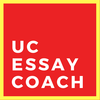
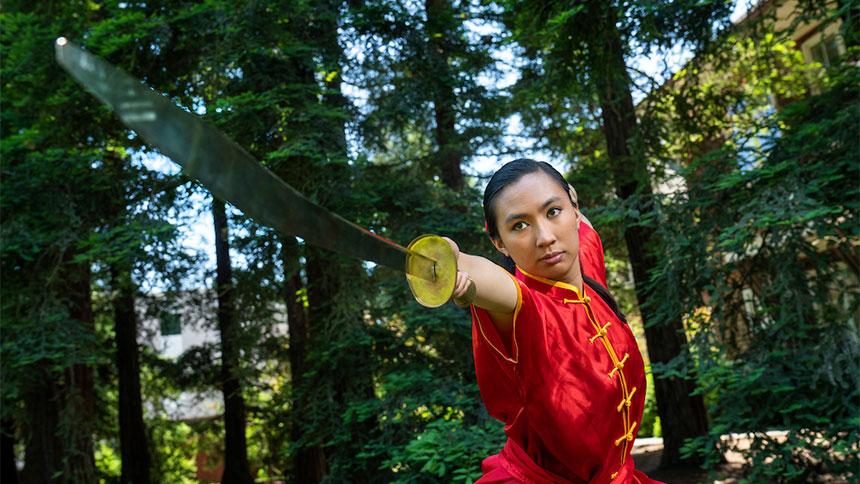
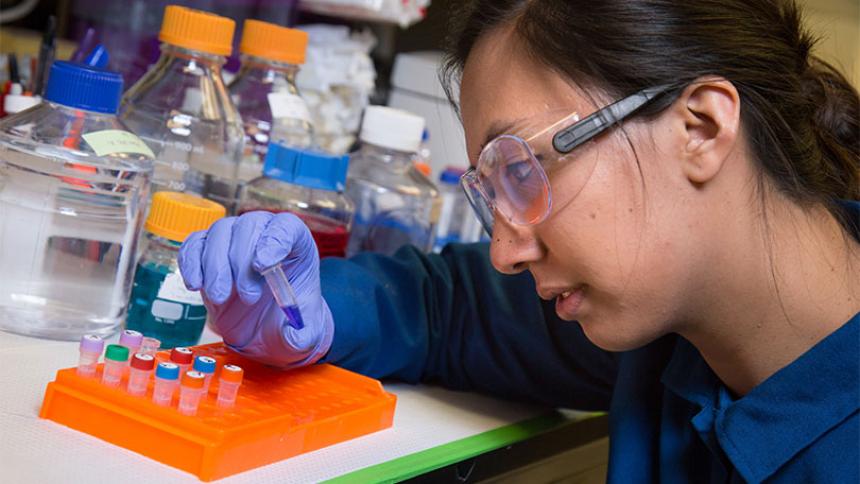
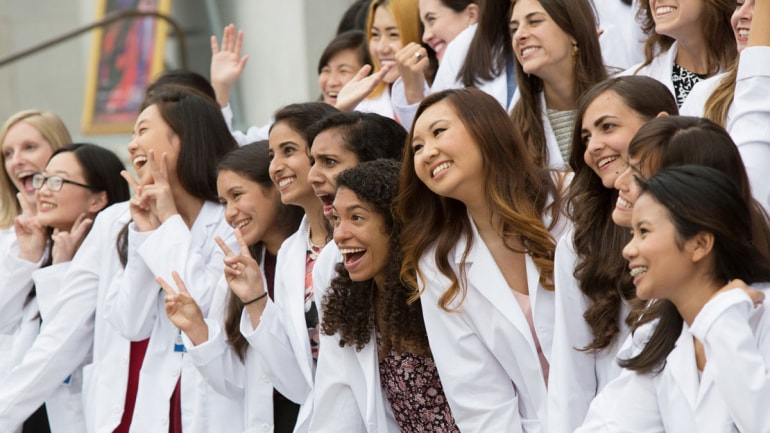
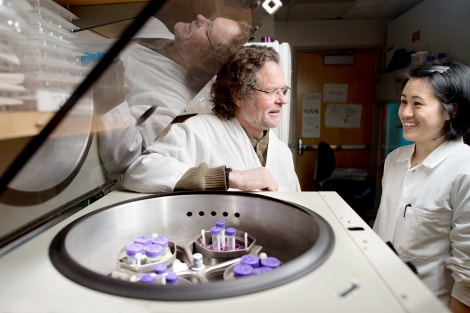
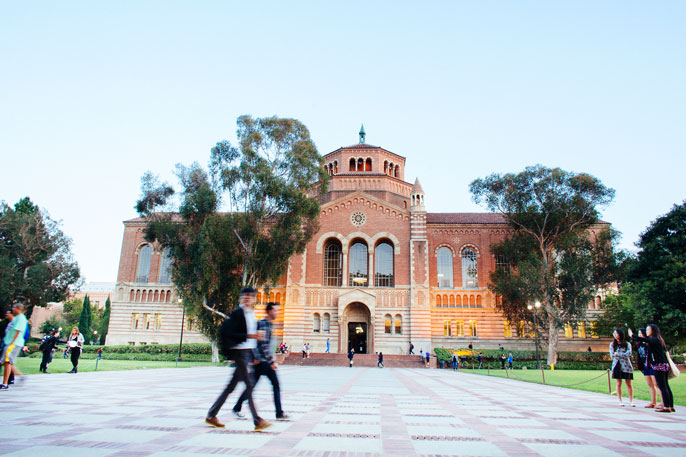
 RSS Feed
RSS Feed